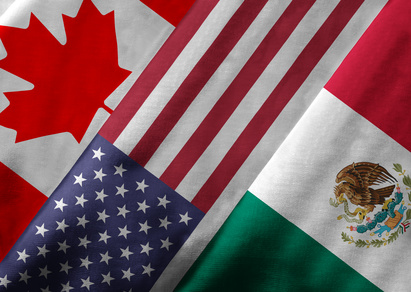Is Free Trade With The U.S. In Jeopardy?

One of the most surreal and nasty U.S. presidential election campaigns has finally come to an end. But for Canadian industries, trade negotiators, and diplomats, the hard work is just beginning. After months of anti-trade rhetoric from the next American president, Donald Trump, Canada must ensure that our trade deals are respected, and push for even more free trade between our two countries.
"Our jobs are fleeing the country. They're going to Mexico. They're going to many other countries," Trump said on numerous occasions. And he likes to blame free trade deals for this state of affairs. "NAFTA, worse trade deal ever!" the billionaire-turned-politician keeps repeating.
For a small, open economy like ours, these comments from the soon-to-be leader of our biggest trading partner are worrisome. But I take comfort in the fact that politicians do not always do what they say, to put it kindly, and that once in office, pragmatism takes over. Besides, Donald Trump never said he was against free trade per se, but rather that he would renegotiate certain deals (which, admittedly, are more often "managed trade" deals than real free trade).
In fact, free trade — and NAFTA in particular — has been so beneficial to both Canada and the U.S. that common sense will have to prevail. Since the entry into force of NAFTA in 1994, productivity has increased across North America. Between 1993 and 2011, customs duties reductions attributable to NAFTA led to increases in trade between Canada and the other two countries of 11 per cent more than would otherwise have occurred. For the United States, the corresponding figure is 41 per cent, and for Mexico, a whopping 118 per cent.
Overall, American trade with Canada and Mexico increased from US$481 billion in 1993 to over US$1.1 trillion in 2015. And while Donald Trump claims that Americans "don't make anything anymore," implying that NAFTA is to blame, the American manufacturing sector has increased production by 58 per cent since the deal came into effect.
NAFTA is a success, and if Donald Trump wants to renegotiate this agreement to obtain "a better deal" for the United States, he will have to make sure to liberalize trade even further.
The opposite scenario would be a "huge disaster," to use Mr. Trump's language. Anything that makes the border harder to get across for people and goods has a direct impact on Canadian workers and on our standards of living. The softwood lumber industry is a case in point. The tariff barriers imposed on Canadian softwood lumber threaten nearly 22,000 jobs throughout the country. The tariffs applied following the latest deal cost Canadian producers over $2 billion — and American consumers $6.36 billion. American producers, for their part, are still calling for the imposition of limits and tariffs (up to 25 per cent) on Canadian imports.
The Canadian economy is showing signs of fatigue. The country's long property boom is starting to cool, and the Bank of Canada has recently downgraded the country's growth outlook yet again. To help navigate through these headwinds, doing business in North America should be made easier, not harder. The flow of goods, people, and investments across borders must continue to grow. Alberta's oil and gas industry, to cite only one example, has a serious need for pipeline projects to help stimulate growth and create jobs — and this means reopening the discussion on Keystone XL.
In this context, the news that Ed Feulner, former president of the Heritage Foundation and a fierce advocate of free trade, has joined Donald Trump's transition team is one more sign that the protectionist rhetoric we've been hearing since the beginning of the presidential campaign may have been just so much hot air. With such quality people surrounding the future president, and with the benefits of free trade so obvious for both countries, I am confident cooler heads will prevail.
Jasmin Guénette est vice-président de l'Institut économique de Montréal. Il signe ce texte à titre personnel.

